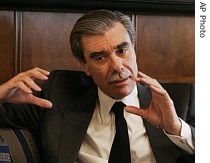-
(单词翻译:双击或拖选)
Washington
21 February 2007
The Bush administration is defending the U.S. economic embargo1 of Cuba, despite the transfer of executive power on the island from ailing2 president Fidel Castro to his brother, Raul. VOA's Michael Bowman reports from Washington, where U.S. Commerce Secretary Carlos Gutierrez spoke3 at length about the embargo Wednesday.
For more than four decades, U.S. law has forbidden American companies from doing business in communist Cuba. In recent years, however, the U.S. government has permitted limited sales of food and medicine to the island that must be purchased with cash.
Speaking at an event organized by the Council of the Americas, Commerce Secretary Gutierrez rejected the Cuban government's oft-repeated contention4 that the U.S. embargo is responsible for the island's persistent5 economic woes6.
 |
| Commerce Secretary Carlos Gutierrez speaks during an interview at the Department of Commerce in Washington |
he said. "The embargo is not the problem. The problem is the repressive communist system, and the only solution is to change the system."
But some foresee change on the island in a post-Fidel Castro era. The Cuban leader had intestinal7 surgery last July and has not been seen in public since. Power has been handed over to Fidel's brother, Raul Castro, who is viewed by many as more pragmatic and less wedded8 to strict communist orthodoxy than his elder sibling9.
Brian Latell is a Latin America analyst10 who has worked at both the CIA and the U.S. National Intelligence Council.
"Some of the top generals around Raul I consider to be modernizers: men who, like Raul, I believe are attracted to the China model: no political opening, but opening of the economy," he explained.
Should the United States relax the embargo of Cuba to reach out to Raul Castro? Absolutely not, according to Commerce Secretary Gutierrez, who was born in Cuba and whose family came to the United States after the island's 1959 communist revolution.
"Cubans on the island are economic captives and they are political captives," he added. "They have become the workers of this hemisphere's last plantation11. Forty-eight years of history have shown us that changes will not occur under Fidel Castro or under Raul Castro. And we believe it is naïve to think otherwise."
Nevertheless, some U.S. industries see a potentially lucrative12 market in Cuba, home to more than 11 million people hungry for basic staples13 as well as consumer goods.
It has been pointed14 out that the United States does business with other communist nations, such as China and Vietnam, and, in decades past, forged a limited commercial relationship with the former Soviet15 Union. But Secretary Gutierrez says he views Cuba more in line with North Korea, with whom the United States has no commercial or formal diplomatic relations, than with China, with whom the United States has robust16 economic ties.
Commerical dealings with communist nations have always required the United States to set aside ideological17 and political differences in order to allow beneficial trade, according to John Kavulich, a policy adviser18 to the U.S.-Cuba Trade and Economic Council, based in New York.
But while the council advocates expanding commercial ties between Washington and Havana, Kavulich acknowledges that bilateral19 trade is a weak tool for promoting change in Cuba.
"We have really become marginalized and pretty irrelevant20, because no matter what we do someone has come to Cuba's rescue," he said. "And so they have no incentive21 to make any changes. That makes us somewhat impotent."
Kavulich notes that Cuba's economy was once propped22 up by the former Soviet Union. Today, Venezuela under President Hugo Chavez provides Cuba with more than $2 billion in fuel and other assistance each year.
 收听单词发音
收听单词发音
1
embargo

|
|
| n.禁运(令);vt.对...实行禁运,禁止(通商) | |
参考例句: |
|
|
|
2
ailing

|
|
| v.生病 | |
参考例句: |
|
|
|
3
spoke

|
|
| n.(车轮的)辐条;轮辐;破坏某人的计划;阻挠某人的行动 v.讲,谈(speak的过去式);说;演说;从某种观点来说 | |
参考例句: |
|
|
|
4
contention

|
|
| n.争论,争辩,论战;论点,主张 | |
参考例句: |
|
|
|
5
persistent

|
|
| adj.坚持不懈的,执意的;持续的 | |
参考例句: |
|
|
|
6
woes

|
|
| 困境( woe的名词复数 ); 悲伤; 我好苦哇; 某人就要倒霉 | |
参考例句: |
|
|
|
7
intestinal

|
|
| adj.肠的;肠壁;肠道细菌 | |
参考例句: |
|
|
|
8
wedded

|
|
| adj.正式结婚的;渴望…的,执著于…的v.嫁,娶,(与…)结婚( wed的过去式和过去分词 ) | |
参考例句: |
|
|
|
9
sibling

|
|
| n.同胞手足(指兄、弟、姐或妹) | |
参考例句: |
|
|
|
10
analyst

|
|
| n.分析家,化验员;心理分析学家 | |
参考例句: |
|
|
|
11
plantation

|
|
| n.种植园,大农场 | |
参考例句: |
|
|
|
12
lucrative

|
|
| adj.赚钱的,可获利的 | |
参考例句: |
|
|
|
13
staples

|
|
| n.(某国的)主要产品( staple的名词复数 );钉书钉;U 形钉;主要部份v.用钉书钉钉住( staple的第三人称单数 ) | |
参考例句: |
|
|
|
14
pointed

|
|
| adj.尖的,直截了当的 | |
参考例句: |
|
|
|
15
Soviet

|
|
| adj.苏联的,苏维埃的;n.苏维埃 | |
参考例句: |
|
|
|
16
robust

|
|
| adj.强壮的,强健的,粗野的,需要体力的,浓的 | |
参考例句: |
|
|
|
17
ideological

|
|
| a.意识形态的 | |
参考例句: |
|
|
|
18
adviser

|
|
| n.劝告者,顾问 | |
参考例句: |
|
|
|
19
bilateral

|
|
| adj.双方的,两边的,两侧的 | |
参考例句: |
|
|
|
20
irrelevant

|
|
| adj.不恰当的,无关系的,不相干的 | |
参考例句: |
|
|
|
21
incentive

|
|
| n.刺激;动力;鼓励;诱因;动机 | |
参考例句: |
|
|
|
22
propped

|
|
| 支撑,支持,维持( prop的过去式和过去分词 ) | |
参考例句: |
|
|
|















